IDEA debug ConcurrentLinkedQueue时抽风
1. 介绍
如标题所见,我在使用IDEA debug ConcurrentLinkedQueue的Offer方法时,发生了下面的情况。
代码如下:
ConcurrentLinkedQueue<string> queue = new ConcurrentLinkedQueue<>();
queue.offer("A");
queue.offer("B");
第一种打断点的地方:
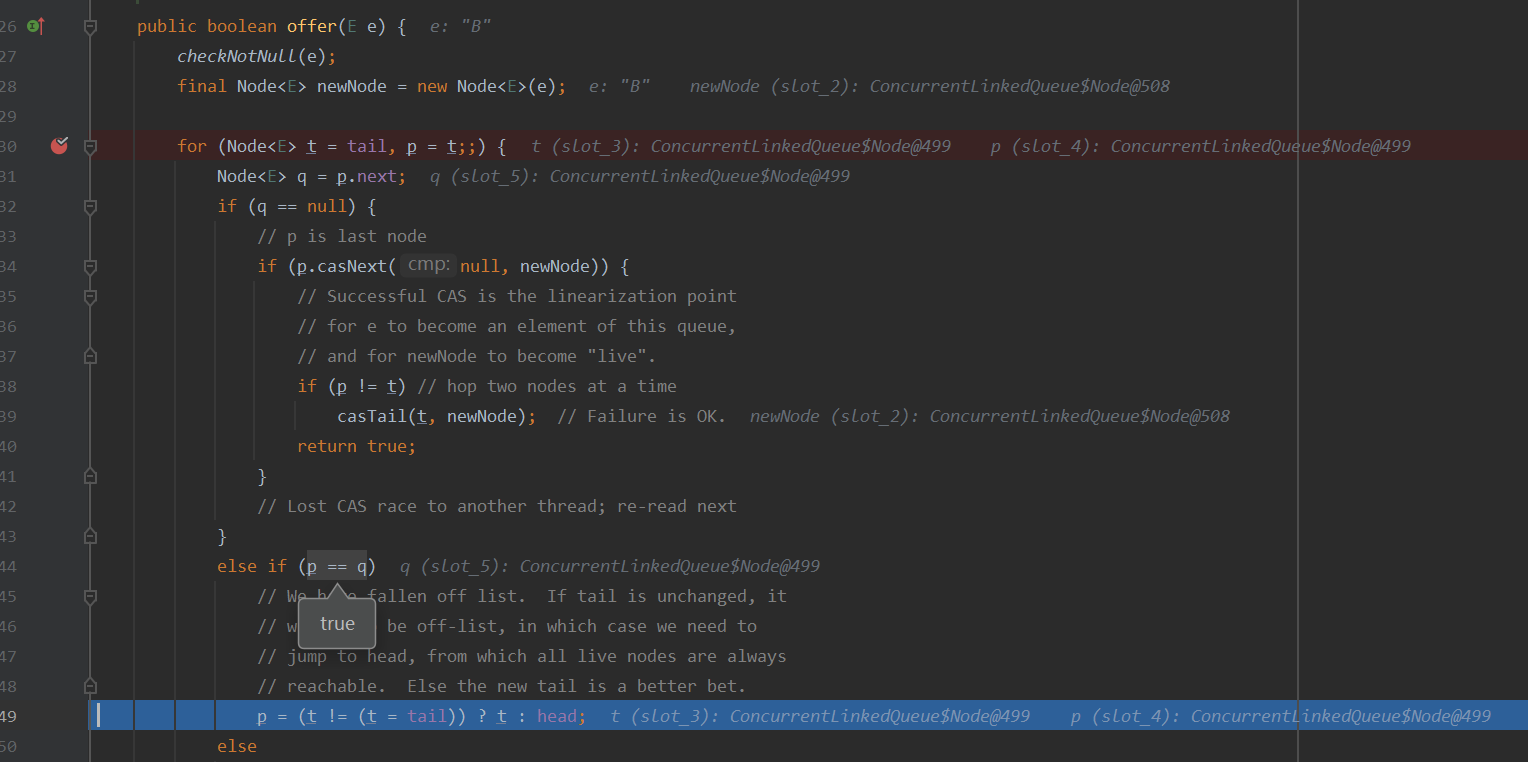
第二种打断点的地方:
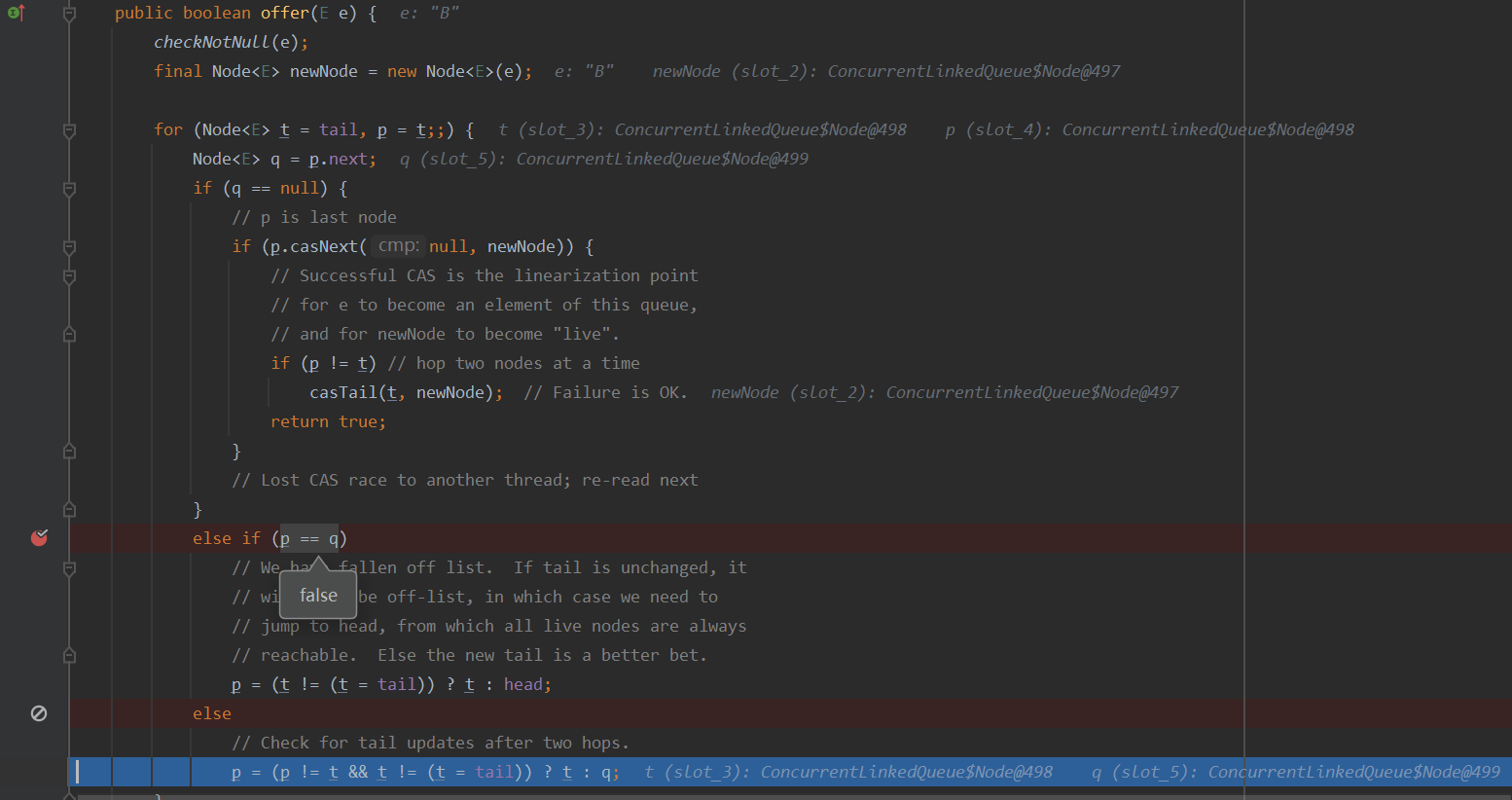
如你所见,相同的地方,打断点的地方不同,导致代码执行的路径都不同,当时我也是迷茫的。
2. 解释原因
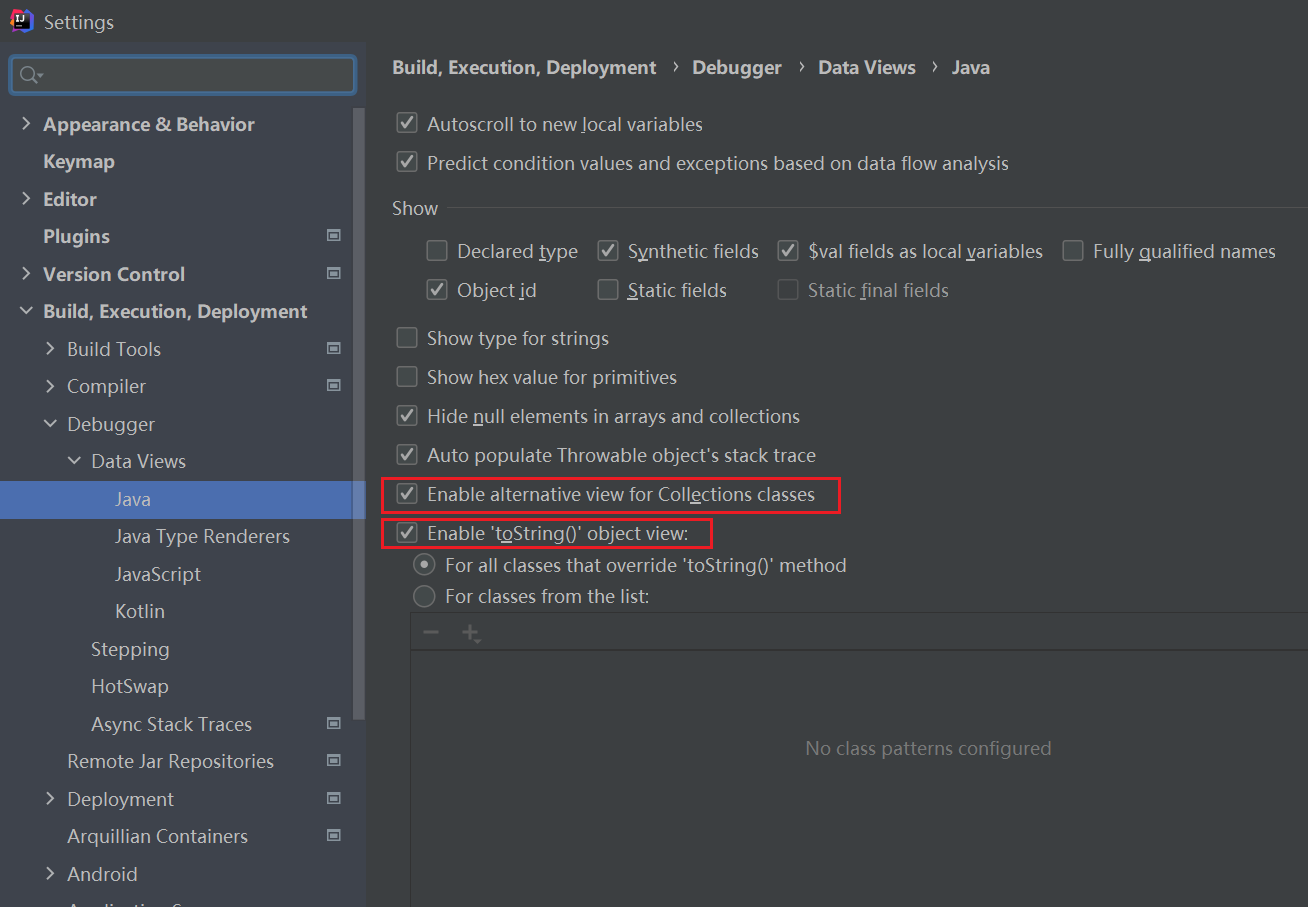 IDEA 默认会开启以上两个配置
IDEA 默认会开启以上两个配置
- Enable alternative view for Collection classes; Select this option to display contents of classes that implement Collection, Map, or List in a more convenient format (for example, to display each map entry as a key-value pair).属于集合的类以更加方便的格式展示其内容(例如,展示map的entry就以键值对展示)
- Enable toString() object view;Allows you to configure which classes use the result of toString() as their display value.展示值以它们toString()的结果展示。
debug时,代码之外,额外执行的只有toString,第一个配置也会调用toString,所以我们定位到了罪魁祸首是toString。我们看看ConcurrentLinkedQueue的toString
2.1 toString
我们去看看哪个类中实现了toString
 👇
👇
 👇
👇

最后找到了AbstractCollection中实现了toString
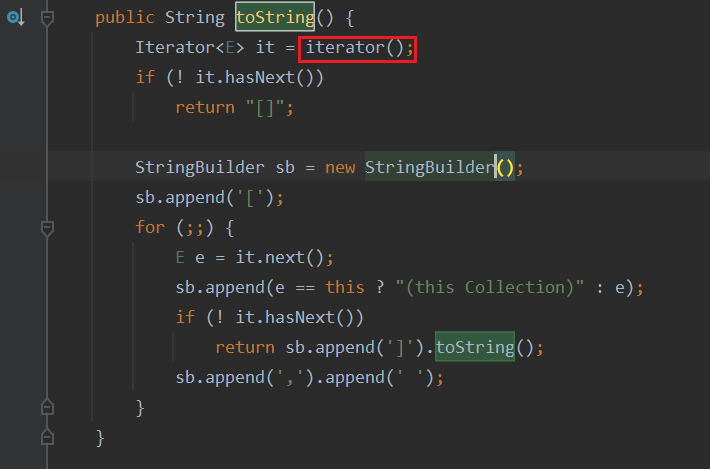
iterator(), 在ConcurrentLinkedQueue有实现。 在iterator()的实现中,跟这篇文章有关的方法是advance()
移动到下一个有效节点并返回 item 以返回 next(),如果没有,则返回 nul
private E advance() {
lastRet = nextNode;
E x = nextItem;
Node<e> pred, p;
// 第一次进来,nextNode还没被赋值,此时默认值为null
if (nextNode == null) {
// 这里就是关键了
p = first();
pred = null;
} else {
pred = nextNode;
p = succ(nextNode);
}
for (;;) {
if (p == null) {
nextNode = null;
nextItem = null;
return x;
}
E item = p.item;
if (item != null) {
nextNode = p;
nextItem = item;
return x;
} else {
// skip over nulls
Node<e> next = succ(p);
if (pred != null && next != null)
pred.casNext(p, next);
p = next;
}
}
}
返回链表第一个活跃的结点(非空,指向的item不为空),如果链表为空就返回null
Node<e> first() {
restartFromHead:
for (;;) {
for (Node<e> h = head, p = h, q;;) {
boolean hasItem = (p.item != null);
if (hasItem || (q = p.next) == null) {
// 更新头结点
updateHead(h, p);
return hasItem ? p : null;
}
else if (p == q)
continue restartFromHead;
else
p = q;
}
}
}
这篇文章也提到过,updateHead()方法。JAVA并发(4)-并发队列ConcurrentLinkedQueue
更新头结点,将之前的头结点的next指向自己。
final void updateHead(Node<e> h, Node<e> p) {
if (h != p && casHead(h, p))
h.lazySetNext(h);
}
2.2 debug
我们按照最上面的代码且按照第一种打断点的方式重新debug,下面会以图片形式展示整个过程。
- 初始状态,此时A已进入队成功
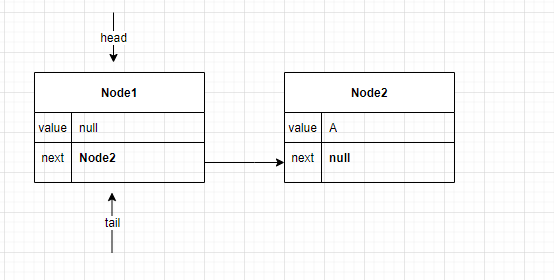
- 我们知道了,使用IDEA debug时,会调用类的toString()方法,此时调用toString()方法后,状态如下
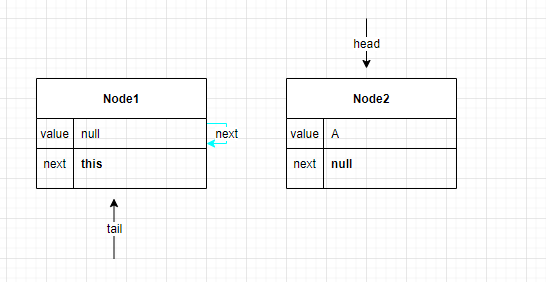
此时,Node1的next被修改成指向自身。 这里也是网上很多博客会认为,第一次入队后,会把第一个节点的next指向自身的原因,其实并不会的。
- 当我们debug到queue.offer("B")时,此时执行到offer()方法中的else if (p == q)时,就为true了
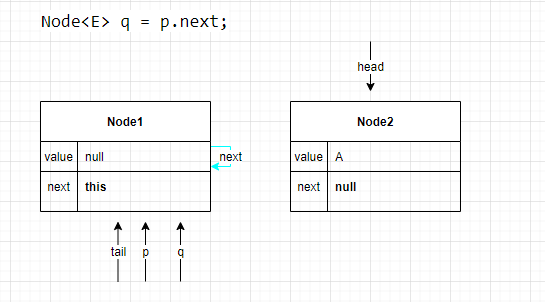
3. 总结
经过了上面的分析,大家应该知道为什么会出现文章开头的问题了吧。也许你会迷迷糊糊的,因为涉及到了ConcurrentLinkedQueue的源码分析。 那我就用一句话,告诉你原因吧,当使用IDEA debug时,默认那两个配置是启用的,两个配置会调用toString,我们应该清楚toString是否被重写;是否影响debug某个类时,代码的执行路径。
可能你会觉得是IDEA的bug(我当时也这样认为),但是我们先看看下面取消两个配置前后的debug情况
取消配置前

取消配置

一眼就可以看出,取消配置前在debug时,更加直观。 可能你会认为是Doug Lea的bug(反正我不敢这么想。当然这句话只是开玩笑啦)。
我只是让大家记住IDEA在debug时会存在这样的问题,大家也可以在评论区告诉其他同学,除了ConcurrentLinkedQueue外,还有哪些类,在哪种情况下会存在这样的问题
可能大家会有疑问,在debug时,调用了toString,那是否影响后续的执行。不会的,因为tail节点会被修改的在后续的执行中。可以结合上面那篇博客,就很清楚了。
4. 参考
- IDEA debug ConcurrentLinkedQueue 的时候踩的坑 --- 给我提供了问题所在
- Customize views
- 并发队列ConcurrentLinkedQueue和阻塞队列LinkedBlockingQueue用法
- java.util.concurrent系列之--ConcurrentLinkedQueue
- 并发队列ConcurrentLinkedQueue和阻塞队列LinkedBlockingQueue用法
- 并发队列ConcurrentLinkedQueue和阻塞队列LinkedBlockingQueue用法
- 转载一篇写的ConcurrentLinkedQueue不错的文章
- Concurrent包中Queue(1)----LinkedBlockingQueue
- 多线程基础总结 之 -- ConcurrentLinkedQueue
- LinkedBlockingQueue和ConcurrentLinkedQueue
- 并发队列ConcurrentLinkedQueue和阻塞队列LinkedBlockingQueue用法
- Java多线程系列--【JUC集合10】- ConcurrentLinkedQueue
- 并发队列ConcurrentLinkedQueue和阻塞队列LinkedBlockingQueue用法
- java.util.concurrent.LinkedBlockingQueue
- java 非阻塞算法在并发容器中的实现(ConcurrentLinkedQueue源码)
- JAVA多线程之——ConcurrentLinkedQueue
- jdk concurrent collection---ConcurrentLinkedQueue原理分析
- JAVA并发十六:并发容器之ConcurrentLinkedQueue
- 多线程基础总结十一--ConcurrentLinkedQueue
- JUC源码分析23-队列-ConcurrentLinkedQueue
- 使用ConcurrentLinkedQueue惨痛的教训
- ConcurrentLinkedQueue
